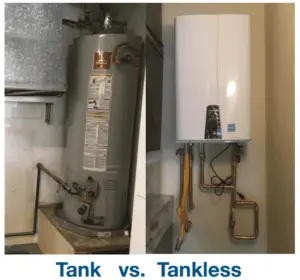Thinking of Switching to a Tankless Water Heater? Here’s What Homeowners Need to Know
Are you thinking about switching to a tankless water heater? The average Gainesville home wastes more energy heating water they never use than running their pool pump all summer. That’s right – your old tank water heater keeps heating water 24/7, even when you’re vacationing at the springs. If you’re considering switching to a tankless water heater, you’re not alone. It’s becoming more popular than food trucks on game day.
 Why Gainesville Homeowners Are Making the Switch
Why Gainesville Homeowners Are Making the Switch
Why would you think about switching to a tankless water heater? The shift to tankless water heaters isn’t just another home improvement trend like those fancy smart thermostats everyone’s installing. There’s real substance behind the switch:
- Average energy savings of 24-34% annually
- Endless hot water on demand
- Space savings (about 16 square feet compared to traditional tanks)
- Longer lifespan (20+ years vs. 10-15 for traditional tanks)
- Better for our Florida environment
These systems have come a long way in recent years, especially in handling our unique Florida climate and water conditions. Many homeowners find their investment pays off faster than a semester at UF.
Understanding Your Current Setup
Before diving into tankless territory, let’s assess your current situation. Your existing system tells us a lot about what you’ll need:
- Age of current water heater
- Fuel type (gas or electric)
- Water usage patterns
- Available space
- Current energy costs
Most Gainesville homes built in the last 20 years already have the basic infrastructure needed for a smooth transition. However, older homes, especially those in historic districts, might need some updates to accommodate modern tankless systems.
The Real Costs of Switching
Let’s talk numbers – and no, we’re not discussing the Gators’ score. Here’s what you’re looking at for a typical Gainesville installation:
Initial Costs:
- Basic installation: $2,000-$4,500
- Possible electrical upgrades: $500-$2,000
- Gas line installation (if needed): $500-$1,500
- Venting modifications: $300-$1,000
But don’t let these numbers scare you away. Factoring in the long-term savings makes the math more appealing than a BOGO deal at Publix. The average Gainesville family saves $100-200 annually on energy costs alone.
What to Expect During Installation
The switch to tankless isn’t as disruptive as a home renovation project. Here’s the typical timeline:
- Initial Assessment (1-2 hours)
- Home evaluation
- System sizing
- Location planning
- Infrastructure check
- Installation Day (4-8 hours)
- Removal of old system
- New system installation
- System testing
- Final inspection
Most installations complete within a single day, though complex cases might require two. Your water service typically only needs to be shut off for 2-4 hours during the process.
Preparing Your Home for the Switch
Making the transition smoother than Butler Plaza traffic on a Sunday morning requires some preparation:
Space Considerations
Your new tankless unit will need:
- Proper ventilation
- Access for maintenance
- Protected location
- Appropriate clearances
Local installers familiar with Gainesville building codes can help ensure your installation location meets all requirements while maximizing efficiency.
Switching to a Tankless Water Heater Common Challenges
Every home presents its own unique challenges, but here are some common ones in Gainesville:
- Electrical Panel Capacity Many older homes need electrical upgrades to handle the power demands. The solution might be a panel upgrade or choosing a gas-powered unit.
- Water Hardness Our Florida water can be harder than trying to find parking during a home game. Installing a water softener alongside your tankless system can prevent mineral buildup and extend its life.
- Temperature Rise Requirements Gainesville’s groundwater temperature varies seasonally, affecting how hard your system needs to work. Proper sizing accounts for these fluctuations.
Switching to a Tankless Water Heater Making the Most
Once installed, optimize your tankless water heater’s performance:
- Set the temperature correctly (120°F is optimal)
- Schedule annual maintenance
- Clean or replace filters regularly
- Monitor energy usage
- Keep vents clear
Regular maintenance keeps your system running longer than a Florida summer.
Switching to a Tankless Water Heater – Environmental Impact
Switching to tankless isn’t just good for your wallet – it’s great for our environment too:
- Reduced energy consumption
- Lower carbon footprint
- Less water waste
- Fewer materials in landfills
- Extended product lifecycle
For environmentally conscious Gainesville residents, these benefits add extra appeal to the switch.
Switching to a Tankless Water Heater Long-Term Benefits
Looking ahead, your tankless investment continues paying dividends:
- Increased home value
- Reduced utility costs
- More reliable performance
- Better water pressure
- Peace of mind
If you’re ready to make the switch, you’ll need expert guidance on transitioning to tankless. Because life’s too short for cold showers and high energy bills.
Switching to a Tankless Water Heater – FAQ
How long does it take to switch to a tankless water heater?
Most installations complete in 4-8 hours, though some homes may require additional time for electrical or gas line updates.
Will I need to upgrade my home’s electrical system?
Many homes older than 20 years require electrical upgrades, costing between $500-$2,000 depending on current setup.
How much will I save by switching to tankless?
Gainesville homeowners typically save 24-34% on water heating costs, averaging $100-200 annually.
What maintenance does a tankless system need?
Annual maintenance includes descaling, filter cleaning, and system inspection, costing about $150-200 per visit.
How long will my tankless water heater last?
With proper maintenance, expect 20+ years of service, compared to 10-15 years for traditional tanks.
Can I install a tankless water heater myself?
Professional installation is strongly recommended due to complex gas, electrical, and plumbing requirements.
What happens if the power goes out?
Gas units with electronic ignition backup will continue working, while electric units won’t function during outages.
Is financing available for tankless water heater installation?
Many local providers offer financing options, making the switch more affordable with monthly payments.